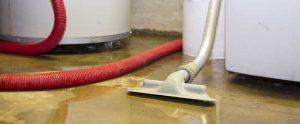Thank you for rejoining us for part 2 of this series on basement moisture. In part 1, you learned that – while a common issue – moisture within the basement can result in serious consequences for your home and your health. You also learned where moisture comes from that is found in the basement and how it transfers into your basement.
In this part of our series, we will outline the signs that there is moisture in your basement and will provide you with a few strategies on how to protect your basement and your home – in general – from this moisture.
What Are the Signs That There’s Moisture in My Basement?
In most circumstances, the presence of moisture in your basement is evident; however, it is imperative that you become familiar with all of the signs associated with basement moisture. That way, should one pop up, you will know to investigate further and deal with the issue as quickly as possible. The following lists these potential signs that may be experienced:
- Water may be seen coming out of the walls of the basement.
- You will see water on the floor.
- The base of the walls in the basement may either be damp or completely saturated.
- The air may seem wet and humid in the basement.
- In the summer, the walls and the floor may have condensation on them.
- You may notice an unusual odor in the air of the basement.
- You may observe the growth of mold and/or mildew in the basement.
- If there is any carpeting or wood in your basement, you may discover that it starts to deteriorate.
- Your wall coverings in your basement may become stained or appear to be blistering.
- The concrete and/or masonry in the basement may start to appear as if it is spalling.
How Can I Solve Moisture Problems and Protect My Basement?
There are several unique strategies that you may use to solve moisture problems and ensure optimal protection to your basement from the water within. The following outlines a few of the top-rated strategies utilized by homeowners:
- Ensure adequate levels of grading by placing dirt all the way around the home so that it actually slopes down and away from the actual foundation wall.
- You should ensure that you have a downspout installed every 50 feet on the eave of your roof. The extensions emerging from this system should discharge all rain water at least 4 feet beyond the water of the basement or the foundation of your home.
- Make certain that your home has a highly effective subsurface drainage system.
- If there is a structural crack in the concrete, you should contact a concrete repair specialist to resolve the issue. Failure to repair concrete could result in immense cracks that could allow larger amount of water into the basement.
- The basement floor is – perhaps – one of the most critical components to your basement and your home, in general. To protect the concrete that it is created from, you should have concrete coatings placed over it. This will provide a highly effective barrier against any type of moisture attempting to enter the basement through the floor or foundation of your home.
Contact Us Today
We here at Concrete Coatings can help eliminate basement moisture by repairing any concrete that is damaged and by protecting your basement floor with waterproof concrete coating. While this may not completely eliminate your moisture problem, it will help to protect your home and your health from the detriment of its damage. For more information, you may contact us today by calling: 706-249-4131

